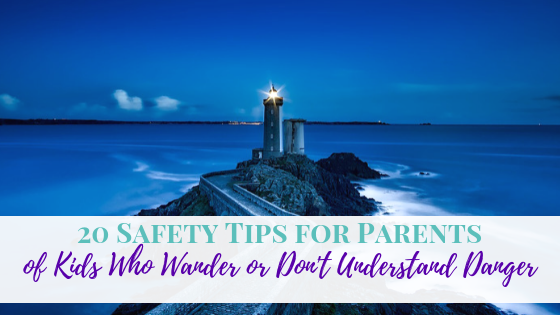Having a child is like having part of your heart walking around outside of your body. For parents, nothing is more terrifying than imagining something happening to your child. We do our best to keep our kids safe and sound, but for some families, it is a much bigger challenge. Many children on the autism spectrum or with other disabilities are attracted to lights or water and are prone to wandering away from caregivers. In many cases, they have no concept of danger and are unable to communicate their names or addresses.
If your child is prone to wandering, it is incredibly important to have a safety plan prepared. Having a plan in place to keep your child safe in different locations is especially vital. Here are a few tips to keep your child safe.
Safety Tips
In your home: Home should be the place where your child feels the safest. When trying to make your home a comfortable, safe place for your child, there are a few things to keep in mind:
- Ensure that all cleaning products are kept well out of reach of your kiddos. Think along the lines of a locked closet or a high shelf out in the garage.
- Secure large furniture to walls using brackets. It’s especially important to do this with top-heavy pieces of furniture.
- Fire safety is important to practice with your kids. Think about buying a fire alarm that is able to record your voice, so your child isn’t frightened when it goes off. A field trip to the fire station will also familiarize them with what firemen and firetrucks look like.
- Water safety is also important. Pools need to have self-closing gates that latch. Children should also be taught how to use faucets correctly, so the water doesn’t get hot enough to scald. Think about placing a mark on faucets to show your child where the temperature could become too hot.
- Consider home renovations to make your home safer, both now and as your child gets older. Many young people with special needs continue to live with their parents long after they become adults.
- A working knowledge of basic medical response and first aid is vital for parents. Consider taking online first aid and CPR classes to familiarize yourself or brush up on your first aid techniques.
Once school starts: Our kids spend a lot of their time at school, and in order for them to concentrate on learning, they need to feel safe. Here are a few ways to keep school safer:
- Familiarize yourself and your child with their school and classroom, and try to meet their teachers before the school year begins. Make sure to provide the school with any information they may need about your child, especially if he or she is prone to wandering.
- Continue to be an active participant in your child’s school community. Consider joining the school’s PTA or volunteering as a chaperone for school functions.
- Know who your child’s friends are, and get to know those children’s parents.
For the ‘adventurers’: Having a child who is prone to wandering can be terrifying for parents. There is nothing more heart-stopping than looking up to realize you’ve lost sight of your little one. Here are a few steps to take in order to keep these frightening moments from happening:
- Set up door alarms to prevent your child from leaving home without your knowledge, and keep all keys out of reach.
- Consider purchasing a child locator. Have your child wear a necklace or bracelet with your contact information listed on it.
- Talk to your child and find out what triggers their wandering. Sometimes you can address these triggers properly and stop their need for wandering. Otherwise, the conversation may clue you in on some of the places they go when they do wander.
Out in public: Going on outings can be stressful if your child doesn’t understand danger or is prone to wandering.
- Start with reasonable expectations of your child on an outing. Try to keep trips short and provide entertainment for your child for the duration of the outing.
- Before leaving the house, let your child know what’s going to happen while you’re out. Let them ask any questions they may have about the outing before leaving.
- Practice traffic safety before and during your outing. Try to make safety fun for your child. Teach them about the need to be patient when crossing the road. Make sure to have reasonable goals for your child’s understanding.
Stranger danger: One of the most important lessons any child can be taught is about ‘stranger danger.’ Even imagining a kid being taken by a stranger can make our stomachs turn. Here are a few things to teach your kids about stranger danger:
- Teach your child who is and who is not a stranger. Make sure to give examples of strangers and people whom they know personally to make sure they’ll understand.
- Next, teach your child what a stranger may say in order to get your child to go with them. There are several lures a stranger may use in this attempt.
- General lures, “Come with me.”
- Assistance lures, “Please help me find my puppy.”
- Incentive lures, “If you come with me, I have candy for you in my car.”
- Authority lure, “Your mom sent me to pick you up, so come with me.”
- Teach your child what to do in case someone tries to use a lure on them. They should yell “No!” loudly, and run to someone they know.
- Role play possible stranger situations in front of them. Have a partner help and demonstrate the scenario. Next, role play with your child and let them choose how they would react in different situations, offering guidance where you can.
- Finally, test your child with a co-worker or friend your child does not know. Go to a public place and have them present your child with a lure. If your child says “No!”, have the person leave the location. If they agree, have the person terminate the situation and talk to your child about what happened. NOTE: It is important that you don’t tell your child this is a test, or they may mistake a real situation for a fake one in the future.
At The End of The Day
As parents, we’re responsible for keeping our kids safe in any situation. The best way to do this is by being prepared and proactive in planning. Knowing what to do to keep your children safe in different settings – and teaching them how to be a participant in ensuring their own safety – can lift a little of the ever-present worry that comes with being a parent.
Pin It For Later

About the Author

Jackie Nunes
Guest Blogger
Jackie N. is a former pediatric nurse and now a full-time homeschool educator. She and her husband have three children. Their middle child suffered a traumatic brain injury when she was 4. Now 11 years old, she is hearing impaired and uses a wheelchair. Despite her challenges, she loves teasing her 14-year-old brother and watching “My Little Pony” cartoons with her 5-year-old sister.
Jackie is also a writer at Wondermoms.org. Wondermom share real talk, helpful information, and practical advice with parents of kids who have intellectual disabilities, Down syndrome, autism, language and speech delays, deafness, chronic illness, and traumatic brain injury.



I am such a helicopter mother, these are all amazing tips!
Same here, I’m a helicopter mom too.
Thanks for sharing these. All things we’re trying to teach our 2.5 year old.
You’re welcome!
i love these tips. our son is 3 and is in need of some help lol
You’re welcome! Hope they are able to help.
We don’t have kids yet, but these are all great ideas to definitely keep in mind.
Thanks for stopping by and reading.
Thanks for the tips. I usually teach about “stranger danger” to my preschool kids each season. They are only 3 but they understand it well!
You’re welcome! Yes, it’s never to early to teach about “stranger danger”.